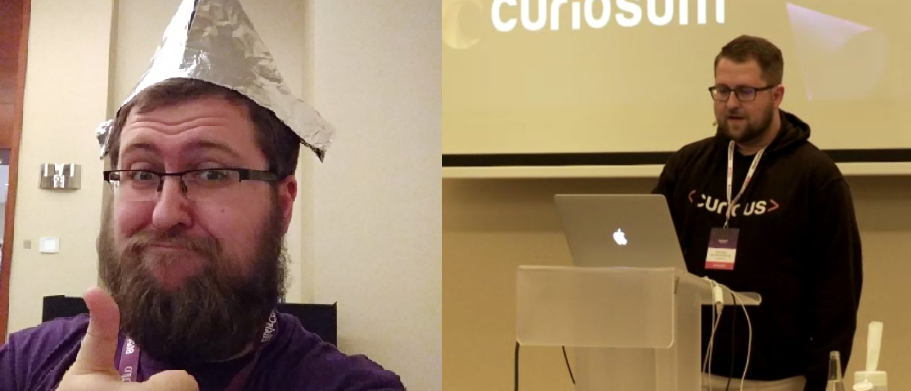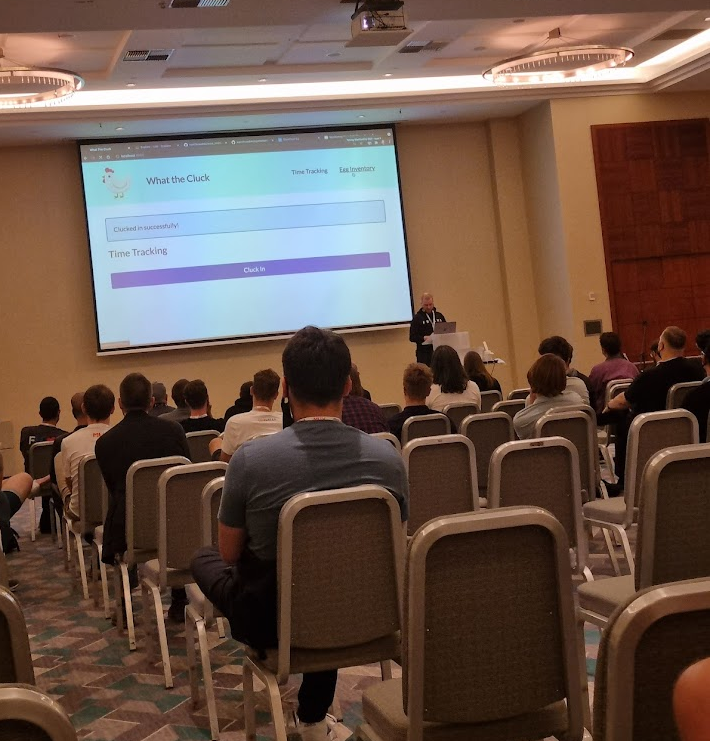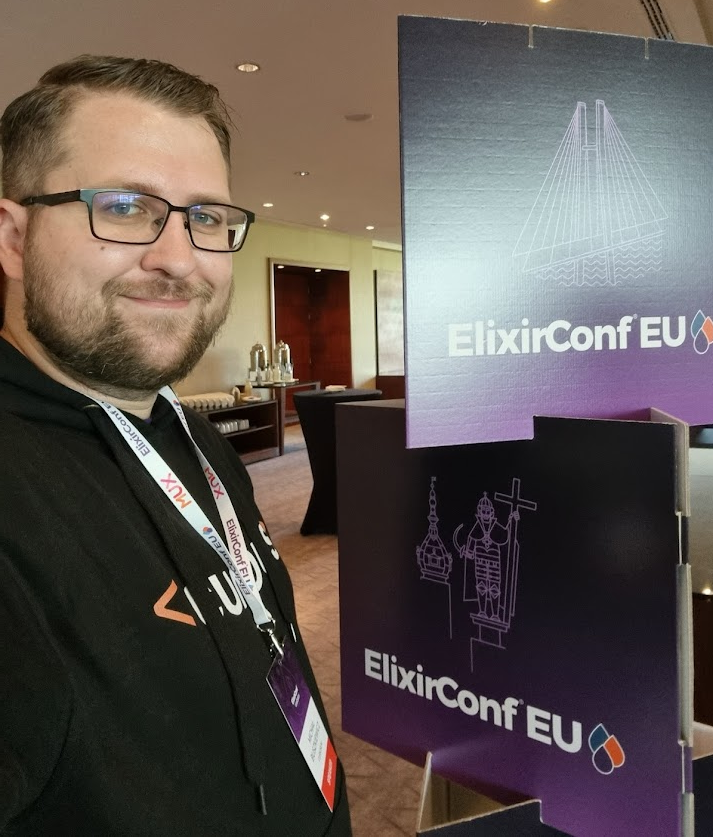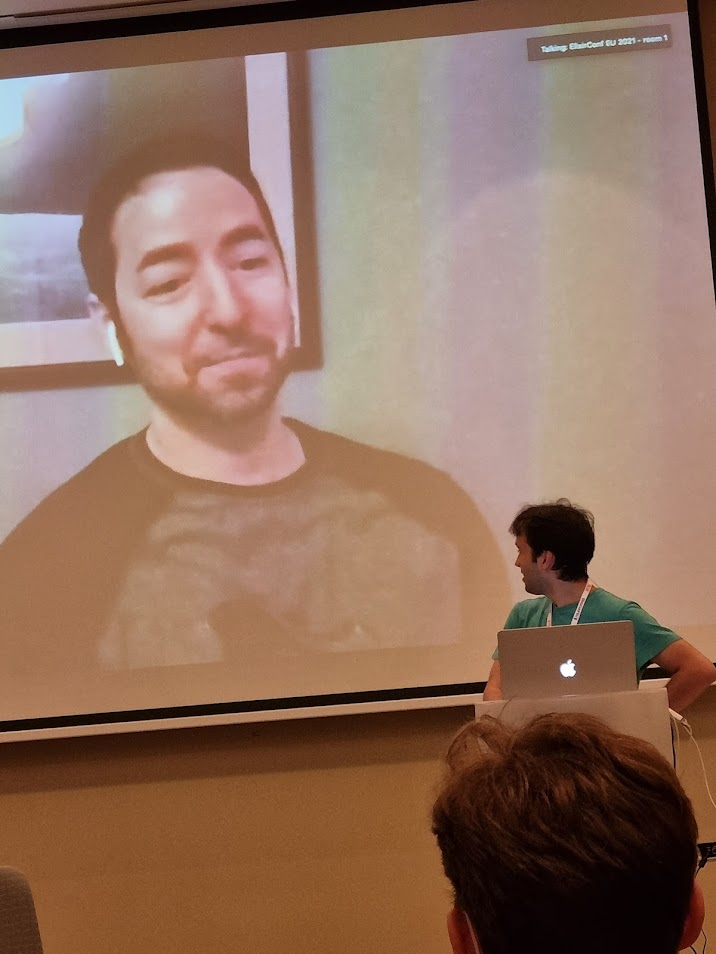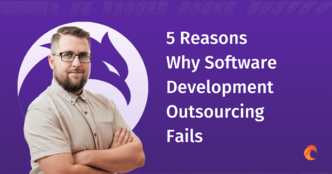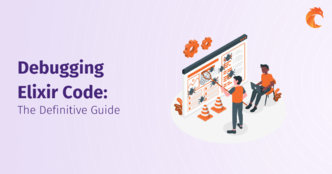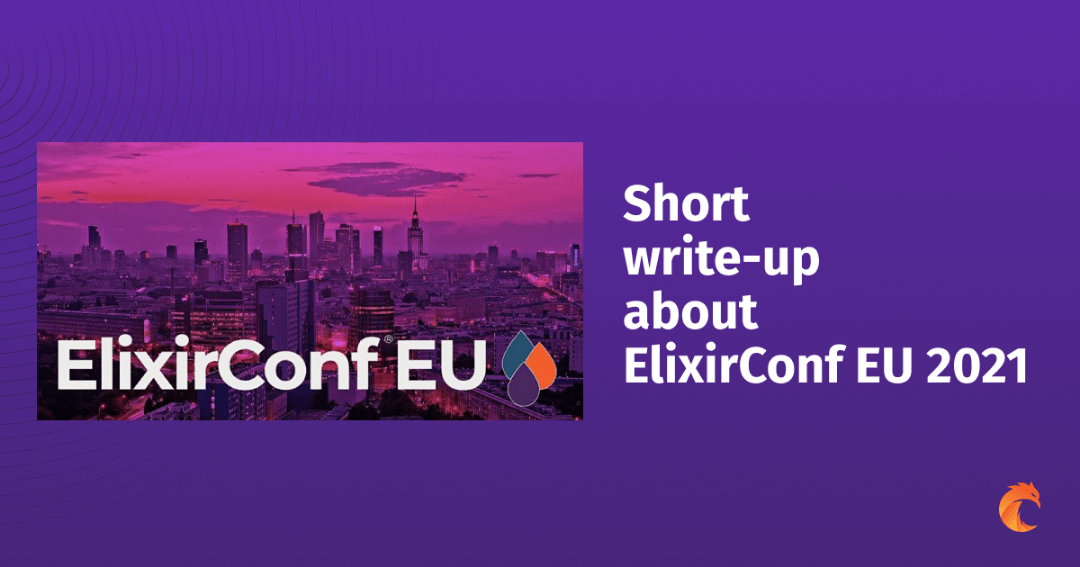
ElixirConf EU 2021 - short write-up from Michał Buszkiewicz
ElixirConf EU let me learn new Elixir tools and best practices, find out how Elixir is going to develop in the nearest future and meet with so many Elixir professionals from different industries in a friendly Warsaw hotel environment. That was great!
Starting off with a blatantly overplayed cliché: when I attended the last proper ElixirConf EU edition in Prague amid the beautiful and warm spring of 2019, I couldn't have had an idea that it was to be the last normal, so to speak, edition of ElixirConf for the foreseeable future.
Seeing as the following 2020 year's events - after initial optimism for what the summer and later COVID-struck seasons would bring - slashed my hopes of any traditional events happening anytime soon, I was so much relieved to finally get to the ElixirConf EU 2021 in Warsaw.
Even more shockingly to the "2019 version of me", this time I used the opportunity to become a speaker - more about which I'll write later in this post.
Me at the ElixirConf EU editions in 2019 and 2021. Did I grow up?
Hybrid conference for Elixir specialists
The organizers made the smart decision to make it a hybrid event, which was an awesome decision even if we don't take the pandemic reality into account: it didn't at all hurt in-person attendance at the Warsaw venue, but still allowed a lot more people to join online inexpensively and participate actively in the conference, so that's a plus that I would love to see being kept even after the pandemic.
This is not a throwback photo. This is a conference audience in 2021.
As usual at ElixirConf, I learned a lot from fellow Elixir practitioners who had a lot of great talks about tools and best practices and had the great opportunity to chat and network with people from both the technical and the business sides of things. Elixir and Phoenix Framework authors were there to answer our questions about the tools' future, and the audience was delighted to hear from them.
So how was it? I had the opportunity to attend the conference both virtually and in-person, and here's my brief, purely subjective, summary.
Day 1 on ElixirConf EU 2021
I had a pretty crazy travel schedule at the time around the conference, so I was glad I could at least join Day 1 as an online attendee - while traveling to Warsaw to go to the second day in-person. And, save for some usual issues with video calls that we all have learned to tolerate, I had a great time.
Take it easy! Clarity can help.
Saša Jurić's keynote, titled Clarity, kicked off the conference with a thorough review on how the namesake clarity should be at the core of how developers approach coding.
It's incredible how often people make their lives harder with antipatterns that _try too hard_ to introduce clarity into their code whereas in fact they obfuscate it themselves by relying too much on internals and implementation details, and - among other points - Saša's cues on how to interpret "unit" in the notion of "unit testing" were very refreshing.
Overall - highly recommended to developers at any level of expertise.
Juicy case studies at ElixirConf EU
Afterward, Kristian Hildebrandt told a story about how they use an Elixir-centered toolset at steel company Kloeckner to aid their business processes. A great case study with a lot of technical "meat" programmers love, presented in a very engaging way - one of the best talks of the conference according to popular opinion.
Orchestration, testing and architectural patterns
At the same time, the second track of talks started next door, with Vanshdeep Singh talking about Control Node, a tool for defining CD & orchestration environments as Elixir code - which is an idea I like a lot since the ability to remain at home with your main language with good tools is just as important as the openness to reach for different languages when it's _really_ needed.
Out of later talks, especially interesting ones to me were Andrea Leopardi's talk about approaches to testing asynchronous OTP and Vasilis Spilka presenting the ideas of event-sourcing and CQRS and how they can be brought into Elixir usage - an overkill idea for many apps I've seen it used in, but something worth exploring on some conditions.
I also liked Michał Ślaski's talk about Erlang crash dumps - few programmers care about the erl_crash.dump files contain, and in fact, it's quite an interesting thing. The day concluded with a traditional lightning talks session.
Day 2 on ElixirConf EU 2021
Then, we got off to Day 2, which was finally the experience I craved for a long time - a traditional, in-person event in full conference rooms. I managed to get to Warsaw in time and was so happy to get there!
This is how a happy programmer looks like, finally out of his basement after 2020's restrictions
The day started with Johanna Larsson's keynote on _Surviving your first big customer as a startup _which touched on many different aspects of how the moment the startup's idea takes off is only the beginning of a struggle.
I found the talk very insightful, both as an active developer and a business executive, so regardless of your role in the game you'll take something interesting off it when you get to watch it.
Day 2 then had plenty of interesting talks, with Kamil Kowalski talking about OpenTelemetry, an interesting observability framework with broad language support and plenty of clever design traits that I liked a lot - something I will surely observing closely in the near future.
Elaine Watanabe's Lessons Learnt from Elixir Learning Paths is something I will surely recommend to Elixir beginners, as testimony from someone who's been through a lot of different ways of learning stuff, pointing out how each of these can benefit the programmer.
Membrane SFU team member Mateusz Front presented the Elixir-centered WebRTC framework, and I found it especially interesting since this is yet another application area in which Elixir has now starting to gain traction.
From attendee to speaker
Quite importantly for me, I had the opportunity to humbly slot in somewhere between all these amazing talks and tell the audience a story about _Debugging Elixir Code: The Tools, The Mindset... and other fac_tors.
I showed off the debugging toolset available in Elixir and a few ways to hack it to satisfy my hardly satisfiable needs, as well as tried - and, I guess, succeeded - to spark a debate about people's attitudes to debugging apps and choosing the right tools for the job.
I chatted with a number of people after the talk and had fruitful discussions with people who appreciated my standpoint while having differing opinions, which I think is very cool!
Read more: Debugging Elixir Code: The Definitive Guide
Q&A
And, now a tradition for several years, Phoenix Framework ace Chris McCord closed the agenda. This time greeting us from his home in a Q&A session as opposed to a traditional final keynote - accompanied on stage in Warsaw by Elixir mastermind José Valim.
The hybrid conference model itself is a new feature that ElixirConf EU has had to adapt to, and this was a hybrid talk during a hybrid conference!
Jose and Chris reacting to the audience wanting "a little bit stronger" typing in Elixir
Without a specific main topic, the Q&A was flowing smoothly from subject to subject. It was fun to hear from Jose & Chris answering questions about their view of what antipatterns they see us, developers, using; what their most obvious but overall low-priority frustrations with Elixir & Phoenix are; or, that - at some point - Elixir was close to being named Hydra, and how only after plenty of time passed did Jose realize that people are using the Elixir name to apply library names that make up for an Universum revolving around alchemy and fluids.
Summary of ElixirConf EU 2021
On top of all the awesome talks, ElixirConf EU was obviously a great networking opportunity, and I found it great to be with all these awesome people again. I saw a few friends that I actually last met at the 2019 Prague ElixirConf EU event, and we were so glad that we could meet in the foyer and talk to each other about what has changed over these two years. And indeed, when it came to changes, we had a lot to talk about...
Next year's ElixirConf EU is going to be held in April 2022 in London, coming back to a usual spring schedule for the conference. History taught us that nothing can be confirmed for sure, but nonetheless, I'd like to say... see you, and never miss another conference!
FAQ
What was the primary objective of ElixirConf EU 2021?
The primary objective of ElixirConf EU 2021 was to provide a platform for learning new Elixir tools and best practices, understanding future developments in Elixir, and networking with professionals from various industries within a friendly environment.
How was ElixirConf EU 2021 structured to accommodate attendees during the pandemic?
ElixirConf EU 2021 was structured as a hybrid event, combining in-person attendance at a Warsaw hotel with the option for online participation. This format allowed more people to join inexpensively and engage actively, regardless of the pandemic situation.
What were the main themes discussed during ElixirConf EU 2021?
The conference covered a variety of themes, including coding clarity, the use of Elixir in business processes, orchestration and testing, architectural patterns, and the application of Elixir in different areas such as WebRTC frameworks.
How did ElixirConf EU 2021 cater to different levels of Elixir expertise?
The conference offered insights for developers of all levels, from beginners to experts, through keynotes, case studies, and technical sessions that addressed various aspects of Elixir programming and best practices.
Can you share a personal experience from a speaker at ElixirConf EU 2021?
Michał Buszkiewicz shared his experience of transitioning from an attendee to a speaker, highlighting his journey through the conference, presenting on debugging Elixir code, and engaging in discussions with the audience.
What networking opportunities were provided at ElixirConf EU 2021?
ElixirConf EU 2021 facilitated networking by bringing together Elixir and Phoenix Framework authors, business executives, and technical professionals, allowing them to interact, share ideas, and discuss the future of Elixir.
What was unique about the Q&A session at ElixirConf EU 2021?
The Q&A session featured Phoenix Framework's Chris McCord and Elixir's José Valim answering audience questions in a hybrid format. It covered a range of topics without a fixed agenda, reflecting the hybrid nature of the conference itself.
What are the plans for the next ElixirConf EU?
The next ElixirConf EU is scheduled for April 2022 in London, marking a return to the usual spring schedule, although the format and execution remain subject to change based on future circumstances.

 8 min read
8 min read
 2 Aug 2024 (created at 15 Sep 2021)
2 Aug 2024 (created at 15 Sep 2021)
